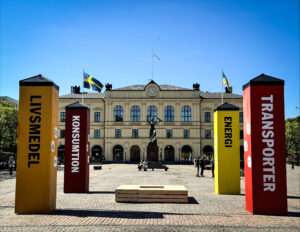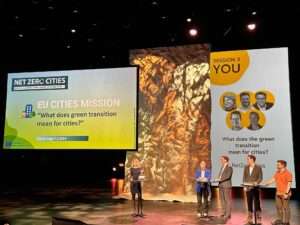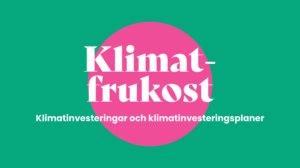Photo: Per Engström
Press release:
Cities account for the majority of climate emissions, and to meet the climate challenge, cities need to accelerate their transition. The Viable Cities innovation programme focuses on creating the conditions for climate-neutral cities in 2030, where everyone can live a good life within the limits of the planet. Innovation in urban cultivation with waste heat from data centres, and models for making music and sports events climate-smart are examples of the twelve projects that will receive a total of EUR 28 million in funding to accelerate the climate transition with digitalisation and citizen engagement as enablers.
- The transition to a climate-smart society is the great welfare challenge of our time and requires a concerted European effort, in principle on a par with the Marshall Plan after the Second World War. Viable Cities puts Sweden at the absolute forefront of finding workable solutions that can eventually be spread and scaled up to accelerate climate change in cities. The twelve projects strengthen existing efforts in a key way and have great potential to show the way to achieving a sustainable fossil-free welfare society," says Robert Andrén, Director General of the Swedish Energy Agency.
The 12 new projects include a wide range of issues that consortia of companies, research actors, cities and civil society actors are tackling together. The Digital Tomatoes project will develop cultivation greenhouses tightly integrated with data centers that use waste heat; in the Public Events as Innovation Engine project, music and sports events will be the engine for accelerating the climate transition; the Mo-Bo project is about more climate-smart everyday life through different spatial design of housing and mobility as a service.
- "Within the framework of Viable Cities, we want to create a portfolio of projects to test and evaluate which initiatives provide rapid and powerful effects to achieve climate-neutral cities in 2030. In our program, we want to work with our cities, companies, and others to find effective ways forward to stay within the framework of the Paris Agreement," says Viable Cities program manager Olga Kordas, who is also a researcher at KTH.
Read more about the awarded projects:
Mo-Bo - Mobility and housing
The project aims to change the way we live and travel in everyday life. With a holistic approach to mobility and housing, the project will increase resource efficiency through sharing services, digitalization and new thinking about the form, operation and use of buildings. Smarter investments enable a new architecture that frees up space, saves resources and creates great value. This project is a continuation of a previous project focusing on new construction. In this new phase, the focus is on existing housing stock for greater scalability. The Rissne area in Sundbyberg is the test bed and the project handles the entire chain from municipal policy to residents' experiences and everyday life to pave the way for a broader system change.
Contact person: Magnus Björkman, Theory into Practice
Public events as an innovation engine
This project will develop methods and models for how public events can accelerate the climate transition in cities. The project brings together Sweden's largest live music festivals, Swedish sports and destinations for joint action with researchers. Since time immemorial, events have brought people together and sparked popular engagement. Producing and staging events requires energy, materials, water, food, and waste management, areas that, like the travel and transportation of audiences and performers, have a significant climate impact. The number of events is increasing, and at the same time there is growing interest in events as a force for change for greater sustainability. Important dimensions are changing behaviors and attitudes towards consumption and citizen engagement.
Contact person: Swedish Live, Joppe Pihlgren
Threat modelling and attack simulation
Achieving climate goals requires digital solutions, but with digitalization, the vulnerability of cities to cyberattacks is increasing. To prevent cyber attacks, vulnerabilities need to be identified. This is very difficult and requires an understanding of the city-wide system architecture and significant expertise in cybersecurity. This project will develop a threat modeling and attack simulation methodology for smart buildings, which play a key role in the future vision of livable cities.
Contact person: Robert Lagerström, KTH
Urban bonds for climate-smart cities
The project will explore how social and climate impacts can be measured and calculated in sustainable bond solutions, thereby helping to mobilize capital. The market for sustainable investments is growing. The aim is to open up investments in new models and solutions that can accelerate the transition to low-carbon cities. Today, few bond solutions support a holistic approach to smart, sustainable cities. The project will create a framework for a sustainable city bond.
Contact: Fedra Vanhuyse, Stockholm Environment Institute
Climate neutral Stora Sköndal
The project is a demonstrator and includes initiatives for smart energy systems, circular resource flows and citizen engagement. By 2035, a socially sustainable and climate-positive district will be built with 4,500 homes and associated schools, preschools, healthcare, services and commerce. The project is based on the unique access that the non-profit foundation Stora Sköndal has as a demanding landowner.
Contact person: Maria Fredriksson, Stora Sköndal Foundation
Digital tomatoes
The project involves developing models for recycling waste heat from data centers for urban food production and soil cultivation in dense urban environments. The goal is to build a first facility in Gothenburg with greenhouses tightly integrated with the data center that is powered by waste heat and biological waste for climate-neutral food production in the city.
Contact person: Fredrik Olson, Greenhouse Living
ReCirculate - circular building materials
Building materials are a major source of climate emissions in our cities. The project focuses on new ways to reduce the extraction of new materials and make use of materials already present in the urban environment, including reuse from demolition and redevelopment projects.
Contact person: Elsa Fahlén, City of Gothenburg
One roof, five opportunities - ecosystem services
Based on Gävle, the project will identify drivers and barriers for property owners (mainly small and medium-sized) to strengthen and preserve ecosystem services.
Contact person: Henrik Dahl, Future Position X
Climate-neutral urban logistics
The project will, based on Gothenburg, explore how the environmental impact of urban logistics can be minimized with a broad introduction of autonomous delivery robots.
Contact person: Sara Berge, HUGO Delivery
Sustainability becomes standard
The project aims to capture innovative solutions from pilot projects in several municipalities. This is to accelerate climate-neutral urban development by enabling new solutions with great potential to become standard in new and existing areas more quickly.
Contact person: Lisa Enarsson, City of Stockholm
Digitalized farming systems
The project develops models for common digital infrastructure for resource flows that connect urban farming, real estate and district heating networks. This is the basis for small-scale urban food production that is climate-smart, efficient and profitable in industrial areas.
Contact person: Irena Lundberg, Invest Stockholm Business Region
Mobility as a service included in housing
The project will develop climate-smart mobility solutions that are included in housing in the new Vårvik district in Trollhättan, where 1800 new homes will be built by 2030.
Contact person: Jörgen Einarsson, City of Trollhättan
About Viable Cities
Viable Cities is a program focused on innovation for smart and sustainable cities. It is one of 17 strategic innovation programs supported in a joint initiative by Vinnova, the Swedish Energy Agency and Formas. The purpose of the initiative is to create conditions for Sweden to take a leading role in contributing to transformative system changes to solve global societal challenges. Viable Cities is coordinated by KTH.
.
For more information, please contact
Program Manager Olga Kordas on 070-213 23 26 olga.kordas@viablecities.se
Unit Manager Susanne Karlsson 016-544 23 75 susanne.karlsson@energimyndigheten.se
Program Manager Emina Pasic on or 016-544 21 89 emina.pasic@energimyndigheten.se
Communication Strategist Åsa Minoz on 072 - 210 88 26 asa.minoz@viablecities.se.




